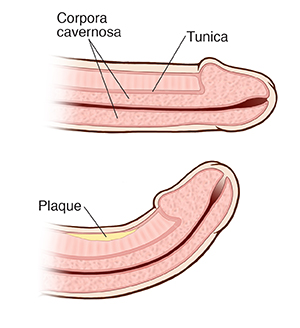A
B
C
D
E
F
G
H
I
J
K
L
M
N
O
P
Q
R
S
T
U
V
W
X
Y
Z
Topic IndexLibrary Index
Click a letter to see a list of conditions beginning with that letter.
Click 'Topic Index' to return to the index for the current topic.
Click 'Library Index' to return to the listing of all topics.
What Is Peyronie Disease?
A slight natural curve to the erect penis is usually normal. But curvature that causes pain and trouble having sex is a problem. The development of painful curvature is called Peyronie disease. Peyronie disease is due to scar tissue (plaque) that forms inside the penis.
Your penile anatomy
The body (shaft) of the penis is made of two columns of spongy tissue called the corpora cavernosa. During an erection, this tissue fills with blood, swells, and becomes rigid, creating an erection. A dense sheath of elastic tissue called the tunica surrounds the corpora. This tissue stretches as the penis becomes erect.

Painful curvature
Peyronie disease occurs when a scar (plaque) forms on the fibrous sheath of tissue surrounding the corpora. The scar can form on any part of the penis. But it's often found on the top or bottom. The scarred area of the tunica loses its elasticity, so it doesn’t stretch when the corpora swells. Because the tunica doesn’t stretch in that area, the erect penis curves in the direction of the scar.
Possible causes
No one is sure just what causes the plaque. It may be the result of an injury to the erect penis or a blow to the groin. The plaque may occur because of a problem with your immune system. But two things are certain: Peyronie disease is not caused by sexually transmitted infections. And it's not cancer.
Symptoms of Peyronie disease
A hard area usually felt below the skin of the penis in the area of the plaque.
Online Medical Reviewer:
Marianne Fraser MSN RN
Online Medical Reviewer:
Raymond Kent Turley BSN MSN RN
Online Medical Reviewer:
Rita Sather RN
Date Last Reviewed:
8/1/2023
© 2000-2024 The StayWell Company, LLC. All rights reserved. This information is not intended as a substitute for professional medical care. Always follow your healthcare professional's instructions.